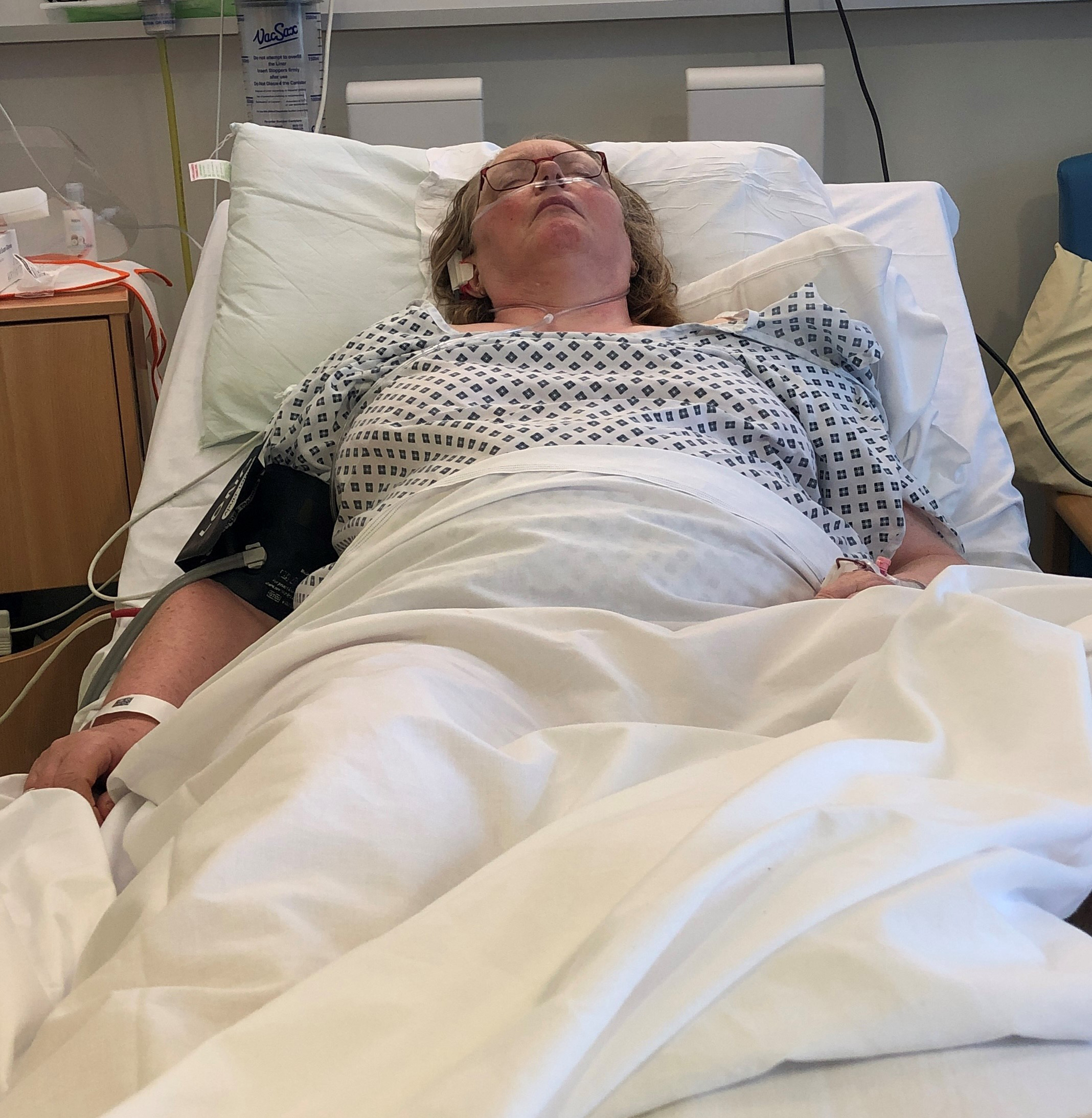62 year-old Lesley became extra susceptible to infections when she developed common variable immunodeficiency. When Lesley was hospitalised with a broken leg and started deteriorating rapidly, her two daughters, Lorna and Joanna, had to argue fiercely with hospital staff to consider the possibility of infection.
Despite this, hospital staff were reluctant to listen, and Lesley received delayed treatment that almost proved fatal… Lesley’s story underscores the importance of advocating for loved ones and the need for Martha’s Rule, the seeking of a second medical opinion, to be exercised at the soonest possible juncture to help curb medical negligence towards sepsis and help save lives.
In 2005, Lesley was diagnosed with granulomatosis with polyangiitis (GPA), a rare form of vasculitis. She was one of the first people in the country to be treated with rituximab, a chemotherapy drug, to help cure her condition. However, as a result, Lesley developed common variable immunodeficiency, rendering her particularly susceptible to infections.
However, at the time, Lesley and her two daughters, Lorna and Joanna, were unaware of this vulnerability, so when the Covid-19 pandemic struck and Lesley was hospitalised with a broken leg, they were unaware of the additional risk of sepsis. Despite her operation being a success, Lorna and Joanna lost contact with Lesley whilst she was recovering in hospital. Lorna observed: “We couldn’t get in touch with her. I tried to ring her and she didn’t answer at first. I rang her again and she answered, and she sounded slurred. I couldn’t get anything out of her that made sense.” Eventually, Lorna was able to decipher one of her messages: “She said: ‘I’ve got to go, all the doctors are around me and my blood pressure is a bit low’, and at that point, I was like ‘right, I need to go’”.
Lorna and Joanna both traveled over 40 miles to the hospital and were shocked to see the condition that their mother was in: “She just looked awful. She was on oxygen. She was confused. I think her blood pressure had come up to 80/50 or something ridiculous and she’d had about 3 litres of fluid.”
Joanna similarly expressed how traumatic it was seeing her mother in such a condition: “I think it took her about 30 minutes to recognise us and even when she did, she was still very fatigued, very confused. To see her like that was horrific, it will never leave me. It will never leave Lorna.”
Deeply distressed, Lorna and Joanna knew that something wasn’t right and that something severe must have been causing her worsening condition. However, they had a hard time convincing hospital staff of their opinion.
“The fights that we had to put up for medical professionals to listen, and they didn’t listen.”
As a registered nurse, Lorna had suggested to Joanna the possibility of sepsis during their car journey to the hospital, and had rang in advance to ask the doctors if they had considered an infection. Lorna stated: “We spoke to one of the junior doctors and he said ‘no, no, her blood isn’t showing it [an infection] yet’ and I said, ‘they’re not going to show it because her immune system is sluggish’.” Despite their protests, doctors did not agree with Lorna and Joanna’s assessment, and perceived her condition to be nothing more than a ‘stress induced response’ to her pre-existing conditions.
It was only when Lorna suggested to the doctors that they should contact critical care outreach that they were finally listened to. After making the call, a critical care team responded to Lesley who agreed with the possibility of sepsis: “She was reviewed by the team, who documented in her hospital notes ‘please consider sepsis and cover with the broad spectrum antibiotic.’ But nobody did.”
Despite these observations, hospital staff were still reluctant to treat Lesley for an infection, with Joanna stating: “We noted that mum’s abdomen was significantly distended and tender. We were told repeatedly ‘it’s not her tummy’ and obviously it was.” Lorna also observed: “I said to the doctor: ‘have you considered peritonitis?’ Because she’d been complaining of tummy pain for the past two days, and he said ‘no’.”
Later that night, Lesely was transferred to critical care after it became apparent that she wasn’t passing any urine and her blood pressure wasn’t showing any sign of improvement. The following morning, her heart rate shot up, her temperature increased, and Lesley was diagnosed with sepsis.

Lorna and Joanna were finally proven right, vindicating the stern stance they took with hospital staff from the outset in demanding urgent antibiotic treatment for their mother: “All of her white blood cell counts shot up and finally, 24 hours later, they gave her a first dose of antibiotics and she stayed in ITU for about four days with no investigation into the source of sepsis.”
In what was already a deeply traumatic experience, the sisters had to contend with the knowledge that the doctors may not have responded to their mother in time.
“She was constantly complaining of pain. She wasn’t eating, she wasn’t drinking, she wasn’t going to the toilet. She’d been seen by multiple different specialists… and all that suggested that they [should] image her abdomen, and nobody did.”
When hospital staff finally did, it was discovered Lesley had burst a diverticular abscess and that the infection had originated in her bowels. Lesely needed an operation to fit a colostomy bag, at which point doctors feared the worst. Lorna stated: “The consultant rang me after the operation and he said ‘I’m really sorry. I have done absolutely everything I can. I don’t know if it’s enough, she might not survive this’.”
Lorna spoke of the outrage she felt towards hospital staff for their reluctance to consider sepsis sooner, and the heartbreak of knowing the fate that might have befallen Lesely had she and Joanna not fought so fiercely on her behalf: “The anger I felt in that moment in time, because I told them eight days before, I was beside myself thinking that she’d been in pain for so long and they could have worked this out for a week. It was absolutely heartbreaking.”
Joanna similarly commented:
“I was heartbroken, the thought of mum being so poorly and being in so much pain. If I hadn’t been so forceful, I dread to think where we would be sat now.”
Thankfully, the operation was a success, and Lesley was able to make a gradual recovery from her sepsis. Lesley now has to live with a stoma, and although she became septic again, the alertness of Lorna and Joanna following her first diagnosis thankfully helped her to get treatment quicker second time round, but not without more ‘stamping of feet’ towards hospital staff: ‘Again her blood pressure was dropping, her temperature was coming up… they said again ‘her bloods don’t reflect it’ and I had to be quite forceful and say ‘it’s not going to, you need to listen to me. you’ve nearly killed her before, I’m not letting you do that again.”
Lorna and Joanna are consequently sharing Lesley’s sepsis story to encourage others to advocate on behalf of loved ones and to seek a second medical opinion if they think something truly isn’t right, or if they feel they aren’t being listened to by hospital staff. The reluctance of medical professionals to listen to Lorna and Joanna’s understanding of their mother’s health conditions meant that Lesley received delayed treatment, and could easily have lost her life had she not had supportive family around her.
Thankfully, critically-ill patients across participating hospitals can now take advantage of ‘Martha’s Rule’: a new system being rolled out to provide patients with ease of access to a second medical opinion. In the wake of Lesley’s story, it is clear that Martha’s Rule is desperately needed to give families the power to challenge doctors’ opinions and get their voices heard.

When commenting on the introduction of Martha’s rule, Joanna conclusively stated: “It’s really sad that it takes those sorts of things to happen, however, I really do hope it’s used in the correct way and it is there to support those families and those patients that are unwell who potentially feel that they’re not being listened to.”